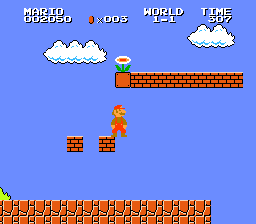Fascinating interview at Slate today with Jeff Ryan, author of Super Mario: How Nintendo Conquered America (which releases tomorrow). I haven’t read the book, but in the interview, Ryan discusses the evolution of the Super Mario Bros. universe and what made it such a popular, groundbreaking game. In addition to talking about how Mario became a worldwide icon, he makes this compelling statement.
Slate: People seem to have endless nostalgia for Mario and the other games that came out in the ’80s, even though they are technologically dated. How do you account for that?
Ryan: There’s a saying that the best science-fiction in the world is whatever you read when you were 12 years old—things have gotten better backupwise, but the game play is always the best when you’re 12 years old. That’s what you are going to remember.
 When I was younger my family had an Atari 2600. Eventually we graduated to the Nintendo Entertainment System (NES), which was a huge step up when it came out. I looked up the year the NES released in the U.S. It was 1985. My family got one several months later than many of my friends — probably not until 1986 — and Super Mario Bros. was the first game I played on the new console.
When I was younger my family had an Atari 2600. Eventually we graduated to the Nintendo Entertainment System (NES), which was a huge step up when it came out. I looked up the year the NES released in the U.S. It was 1985. My family got one several months later than many of my friends — probably not until 1986 — and Super Mario Bros. was the first game I played on the new console.
How old was I in 1986?
You can guess: I was 12.
My kids have discovered the Super Mario Bros. universe on the Wii, from Mario Kart to New Super Mario Bros. Wii and even a fantastic 25th anniversary edition in which we can play the original NES game. I’ll always play those games with them, when asked. And I enjoy them, too. I never got much into the first-person shooters or massively multiplayer online games, but anything Mario is my video game currency.
So I think Jeff Ryan’s 12 year-old hypothesis is spot-on…at least for me. My kids aren’t yet 12, so there’s no telling what game or games might become their baseline.
Which got me to wondering: What about you? What’s your 12 year-old video game? List it in the comments and try to figure out how old you were when you first played it. We may find that “favorite video game” is a good indicator of age.

